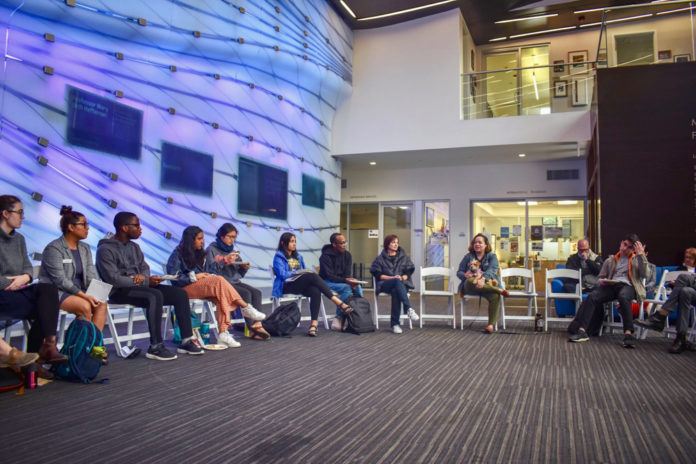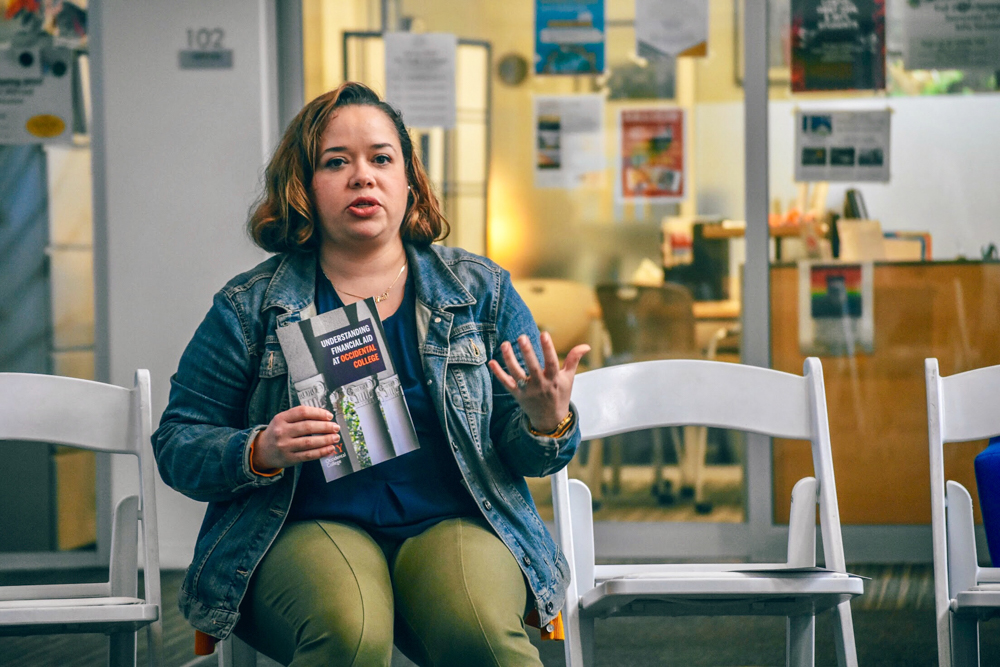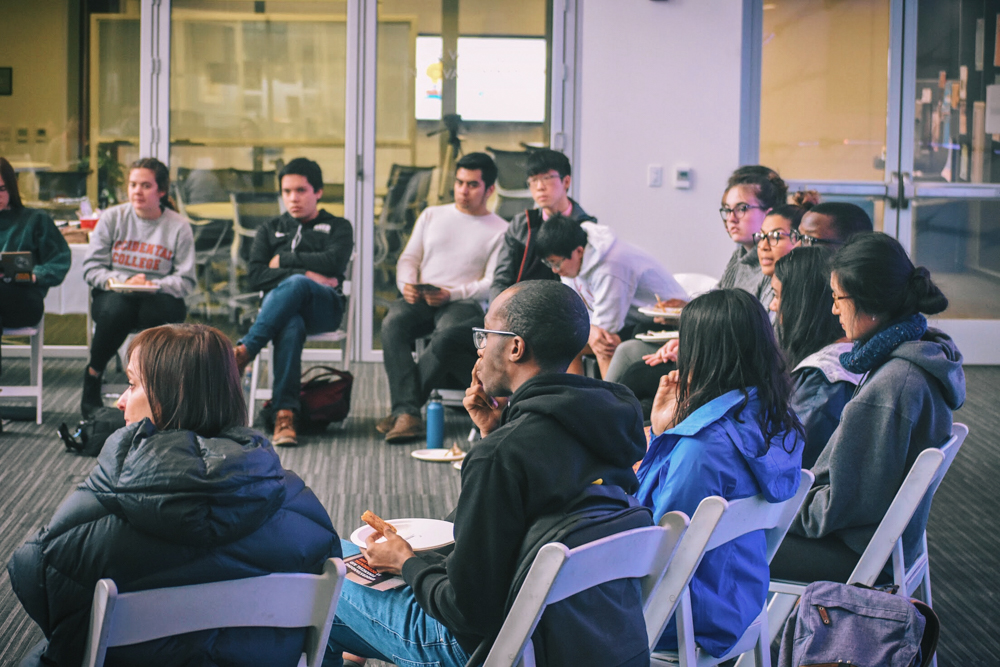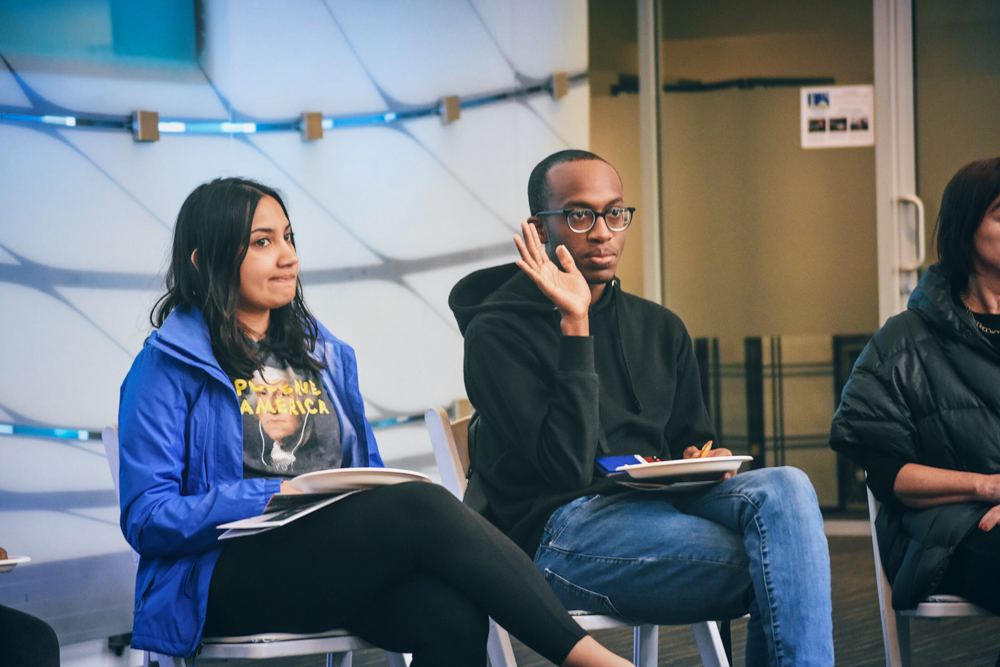
The Associated Students of Occidental College’s (ASOC) Senate and Diversity and Equity Board (DEB), along with the Financial Aid Office (FAO), co-hosted a Financial Aid Town Hall Feb. 13 in Johnson Atrium. The town hall included discussion on how financial aid works, opening up lines of communication, and important updates from the FAO.
The town hall occurred after then-sophomore class senator Darla Chavez Chavez, sophomore class senator Olivia Shinners and DEB Financial Aid and Admissions Liaison Ryley Goulet (junior) sent out an anonymous survey in mid-November 2018 asking for people to share their thoughts regarding the financial aid process at Occidental.
According to Chavez Chavez, concerns over the calculation of Expected Family Contribution (EFC) represented one of the themes raised in the survey. At the town hall, Director of Financial Aid Gina Becerril explained what the EFC is and how it works.
“College applications to Occidental determine what the family and student can contribute. The FAFSA [Free Application for Federal Student Aid] and CSS [College Scholarship Service] Profile calculate the EFC from all the info on family income,” Becerril said. “They are the calculators that provide the FAO with a basis on how to determine what a family needs to get their student to college. As many of you know, there is always something particular to your family. There are families going through special circumstances and changes in financial circumstances. The EFC determines what the family needs to contribute, and from there how much financial aid, loans and work-study are given.”

According to Becerril, the FAO is working on sending out inquiries to provide families information on financial aid at Occidental early on.
“Part of my mission is to try to get this info to families soon,” Becerril said. “It can be hard once a student gets accepted to a college and then they are faced with, ‘the tuition is how much?’”
According to Becerril, financial aid literacy is helpful to students during the college application process because it can help demystify the idea that students should not apply to a high-cost school.
“Students are often surprised how the financial aid they receive from high-cost institutions can be better than from low-cost ones,” Becerril said.
The next question students raised was why tuition increases every year. According to Becerril, there has been roughly a 3.5 percent increase annually since she arrived at Occidental in 2004. Chris Ferguson, associated vice president of financial aid, explained that the increase in tuition is not within the control of the FAO, as the Board of Trustees sets the cost of tuition and room and board each year.

“There’s a group of senior leadership [Vice Presidents and the President] that look at other institutions to see what the general annual increase will be so that Occidental doesn’t have a higher annual increase than them. The Board of Trustees makes the decision to increase because they need it to pay the bills,” Ferguson said.
Chavez Chavez raised the question as to whether or not financial aid at Occidental is given on a first come, first serve basis. Emily Valk, assistant director of financial aid, explained that the FAO has a priority deadline of March 2.
“It’s not first come, first serve, but we do have limited funding. If students are submitting really late in the game, they run the risk of losing out on aid,” Valk said.
According to Valk, they often make exceptions to the March 2 deadline if families face extenuating circumstances.
“We do have money reserved for special circumstances, but if the student still hasn’t submitted, that money is getting even tighter,” Becerril said.
Another question students raised was as to how the college determines institutional donor-based scholarships. Becerril explained that these scholarships are determined by the financial aid student supplements, which require information about the activities and groups students are involved with on campus.

“When we determine your financial aid, we give you an Oxy need-based scholarship or grant, which we can give to you because donors have given us this money for financial aid,” Becerril said. “Donor scholarships are determined by your activity, majors. Donors like to give money to things that are close to their heart. Once we receive info about the student, we can do the pairing with the donors.”
Another concern raised by students was how it can be hard for first-generation students whose families are unfamiliar with the financial aid process, noting that becoming a resident adviser (RA) or participating in the Values and Vocations Fellowship can affect one’s financial aid. According to Becerril, these programs are the highest paid jobs on campus, and federal regulation says that whatever a student receives after their financial aid must be accounted for in their financial aid.
Associate Director of Financial Aid Craig Organek explained that the FAO must comply with federal regulations that are impersonal to each individual student.
“Congress made up rules and regulations that can’t be specific to every student. They start at a base knowledge of ‘we’re treating everyone this way based on these formulas,’” Organek said.
Valk and Maggie Rocha, senior financial aid counselor, shared some of their takeaways in an interview with The Occidental following the Town Hall.
Valk said what concerns her most is students feeling like they cannot come to the FAO with their problems, application difficulties or personal family circumstances. Some ideas brought up during the town hall included daily FAO office hours and partnering with different vendors to create financial literacy workshops.
“We’re trying to find ways that students can feel like they can come to us but also that we’re finding ways that we can meet them halfway so that the onus is not entirely on the student. We’ve been talking about maybe having a suggestion box in the office, so students can give us their questions or concerns anonymously,” Valk said.
In 2019, the FAO plans to implement an addendum to award letters, which will give a further breakdown of costs and aid to address the confusion students often feel upon receiving their awards. According to Rocha, the FAO is also using social media as a tool to provide information regarding common questions from students.
“When we were working with ASOC and DEB on planning this, we really envisioned it as the first in a series of conversations to come,” Valk said. “I’m really glad that there were good inputs and a lot of ideas about different ways to open up lines of communication so that we’re all on the same page and students are getting what they need.”
![]()






























